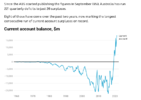Flat rates no security no benefits welcome to labour hire land!Public sector wages, benefits et al are well above private now trawler. Public sector gigs are now plum jobs given to people with power and/or connections, usually a parent that's already a high ranking public servant.
The only other way to get your foot in the door is if you meet some kind of diversity criteria. Competence has virtually nothing to do with it, not any more.
Remember before covid how flat the economy was the above is a big part of the problem


